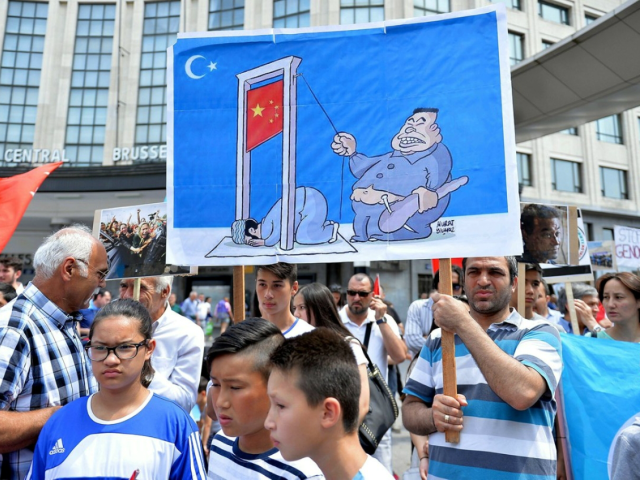The fervently pro-government Turkish newspaper Yeni Safak published a column by its editor-in-chief Ibrahim Karagül on Saturday accusing China of “genocide” against its Muslim Uighur population, a significant deviation from the silence typical of the Muslims world in light of China’s decision to force millions of Uighurs to renounce their faith in internment camps.
Karagül lists China among other nations such as the United States, Russia, and the member states of the European Union as “carrying on a global war against Islam.”
Human rights researchers estimate that the Chinese communist regime has forced between one and two million Muslims – most ethnic Uighurs, but also Kazakhs and Kyrgyz people – into their camps, which Beijing calls “vocational training centers” but survivors say are more akin to “concentration camps.” Camp survivors say government officials torture them to force them to renounce Islam, worship Communist Party leader Xi Jinping, learn Mandarin, and memorize communist propaganda songs. The most recent reports suggest that China has begun equipping the camps with factories where prisoners are forced to work without pay.
The Uighurs are a Turkic people who speak their own Turkic language, arousing the concern of the Turkish government. While Turkish President Recep Tayyip Erdogan referred to the abuse of Uighurs in their native province, Xinjiang, as “genocide” a decade ago, Erdogan has since signed up to Beijing’s “Belt and Road” economic program and ceased criticizing the Communist Party’s documented abuse of Muslims.
The column appearing in Yeni Safak, which has a record of strictly keeping in line with the opinions of Erdogan’s Islamist Justice and Development Party (AKP), may signal that Ankara is more displeased with the internment of Muslims in the region than Erdogan has let on recently.
In a column titled in part, “The Struggle of Both Turkestan [Central Asia] and Palestine Is Ours,” Karagül urges Muslims to unite as a nation and struggle against all countries that attempt to curb the spread of the religion, not just the West. Uighur separatists typically refer to Xinjiang as “East Turkestan.”
“As much as east Turkestan is ours, the tragedies in the Caucasus are part of our history. … Anatolia’s long history of resistance, Bosnia’s history of struggle are one and the same as east Turkestan’s resistance history,” Karagül argues. Anatolia is an ancient name for most of Turkey.
“If our hearts do not beat for the heart of the land, which spans the Atlantic’s coasts, Pacific coasts, the Indian Ocean and the Great Wall of China, if it does not beat for our region which we call the middle zone, we cannot possibly develop an awareness or identity,” Karagül argues. He goes on to list the alleged crimes of various nations around the world against the Muslim world, accusing the United States of being behind the deaths of “millions of people.”
“Our cities turned to ruins. China has been applying genocide on the Uighur people for years. India is carrying out massacres against Muslims. We know how Russia oppressed the Caucasians. We are generations surrounded on all four sides,” Karagül continues.
“While these countries are carrying on a global war against Islam, they are also establishing organizations through Muslims in preparation to destabilize target countries and make them kneel,” Karagül also alleged, suggesting that moderate Muslim groups are a threat to the Muslim world generally.
Karagül’s use of the term “genocide” is not unprecedented. In 2009, following a violent crackdown by Communist Party officials on Uighurs in Xinjiang, Erdogan stated that “the incidents in China are, simply put, a genocide.”
“There’s no point in interpreting this otherwise,” he emphasized.
The Chinese regime replied by calling Erdogan’s remarks “irresponsible and groundless.” Ultimately, Beijing allowed Erdogan to visit Xinjiang three years later to assess the situation himself, the first time in nearly three decades that a Turkish head of government made the trip. Rather than focus on treatment of Uighurs, that visit centered on discussions of growing trade ties between China and Turkey.
When news of crackdowns on the practice of Islam intensifying in Xinjiang emerged in 2015, the Turkish government used much less strident language than Erdogan’s six years prior.
“Our people have been saddened over the news that Uighur Turks have been banned from fasting or carrying out other religious duties in the Xinjiang region,” the Turkish Foreign Ministry said in a statement. “Our deep concern over these reports have been conveyed to China’s ambassador in Ankara.”
In response, Chinese Communist Party chief Xi Jinping invited Erdogan to “cooperate” on terrorism investigations. Chinese officials insist that eradicating public adherence to Islam is necessary in Xinjiang to combat radical Islamic terrorism.
“In order to promote even greater development of relations, China and Turkey must respect and give consideration to each other’s core concerns, and deepen security and counter-terrorism cooperation,” Xi said in remarks to Erdogan relayed by the Chinese Foreign Ministry at the time.
The robust Turkish economy of 2009 had by then largely yielded to a stagnant Turkish economy, which floundered further in 2018 after Washington imposed sanctions on the country over the imprisonment of American pastor Andrew Brunson. In August, just as the sanctions took hold, Erdogan announced that Turkey would involve itself more closely with China’s “Belt and Road Initiative,” an economic plan to trap developing nations in debt and compromise their sovereignty to China.
“We are expecting to deepen cooperation based on mutual interests with China. We will join the ‘One Belt One Road’ initiative more actively,” Turkish Foreign Minister Mevlut Çavuşoğlu announced.
The Turkish government has not vocally condemned the treatment of Uighurs in China since that announcement. Between the 2015 condemnation of Uighur abuse and the 2018 Belt and Road announcement, the U.S. State Department, international journalists, and human rights NGOs confirmed the development of internment camps for Uighurs and other Muslims, used to force them to abandon their faith and culture.

COMMENTS
Please let us know if you're having issues with commenting.